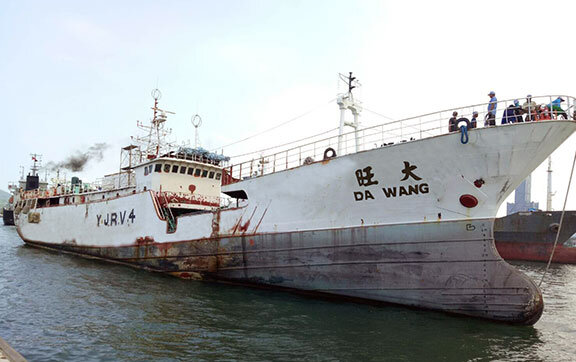Not long ago a I wrote about the US Custom and Border Protection Agency (CBP) withhold release order against tuna and tuna products from the Tunago No. 61 based on information obtained by CBP indicating tuna is harvested with the use of forced labour, including physical violence, debt bondage, withholding of wages, and abusive living and working conditions.
From the 18 august a 2nd Vanuatu flagged vessel, the “Da Wang” has now also been added… so far Vanuatu is the only flag state that is in that list.
Thankfully none of the vessels is in the FFA list of good standing, yet they still in the WCPFO registry
While the vessels are Taiwan owned and operated, the factual reality is that what happens on those vessels competes to the flag state authority… the capacities of Vanuatu or their development status, are no excuse when it comes to flag state responsibility.
As I was told in the navy and the fishing boats many times… if you cannot live up to a responsibility don’t take it...
Vanuatu had already one of the 1st EU yellow cards, which was based substantially on the failures as a flag state (see the decision- last country).
One thing to keep clear is that Vanuatu is not a small player in fishing… it runs an open registry (with over an estimated -no one really knows exactly- of 100 vessels among fishing vessels and carriers). Furthermore, they are a contracting Member of IATTC, WCPFC, IOTC, ICCAT and cooperating non-Contracting Party to CCAMLR… hence their fleets is all over the world. Yet the last commercial landing in Port Vila was in 2014 and maybe a couple of pretending ones since then… but the vessels don come there… many of them use Suva as their port.
I helped with the removal of the Yellow card… yet I’m not sure how come they got away, to be honest… I remember they had a very smooth ambassador to the EU that obviously was doing a good job there… they got lots of money to develop their competent authority to gain EU market access… yet they never did much with that. They got to host an EU workshop on the impact t of ecolabels… even if they don't qualify to access to the EU. they signed PSMA, but haven done anything about it… and “hosted” a workshop wjhere nobody came after the 2nd day… and the list goes on
In any case, the EU was supposed to go back to visit them, on the back of the reissue of the yellow card they reissued to Panama… a country that shares many flag state (i)responsibilities issues with them.
While this issue relates to crew… something I feel very strongly about and I’m working on… I find it sadly ironic because Vanuatu very stringent on immigration when you arrive by plane and come to work for a couple of weeks at the request of their own goiverment and they charge over 300USD for a visa and ask you for a lot of papers…. Somehow you can go and work on a Vanuatu flag fishing boat without any paperwork or being accounted (or unaccounted) for…
As a member of FFA, they should be incorporating labour issues as part of their licensing procedures as explained here
In any case… they are also a key player in the of the biggest fisheries headaches we have in the region… transhipments at sea.
While the WCPF Convention expressly prohibits transhipment at sea (on the high seas and in a WCPFC Member’s territorial sea and exclusive economic zone) by purse seine. For longliners and other vessels, however, the WCPF Convention only requires CCMs to “encourage their vessels, to the extent practicable, to conduct transhipment in port”. Furthermore, through a binding conservation and management measure (CMM 2009-06 the WCPFC prohibits longliners and other vessels from transhipping on the high seas except where CCM has determined that “it is impracticable for certain vessels . . . to operate without being able to tranship on the high seas.”
CMM 2009–06 requires WCPFC Members to make vessel-specific determinations as to impracticability and submit a plan detailing the steps being taken to encourage transhipment in port. And that is not happening…. In fact, over the last two years, just 3 CCMs—China, Chinese Taipei, and Vanuatu—accounted for 84% and 89% of those transhipments in 2015 and 2016, respectively and we are talking over 100 transhipments a year… I wrote about all this before.
Anyway if we get hold on the transhipments situation, many collateral benefits associated with port transhipment come into game:
Under and Misreporting: FFA’s IUU quantification report identified “Unreported” as the main IUU issue in the region, having transhipment in port, under similar conditions of that PPS and with the use of scales will be a massive step towards compliance
Observer Coverage: having LL coming to port is key to increase the agreed percentages of Observer Coverage
Electronic Monitoring: the main limitation for the HS vessels are maintenance of the equipment and the delivery of the footage ((hard drive based) to the national observer. Using carriers provides big delays and compromises the CoC for the hardware
Labour issues: these could be dealt in much more depth trough having the vessels coming to port
Safety: transhipment at the port are fasted and safer than at seas as a port are more protected to whether and swell
MARPOL: longliners coming top port can easily comply with their MARPOL obligations
So yeah… this is bad news for all of us in the region… and I wish there was something that could be done with Vanuatu ton rail them into better flag state performance and changing their stand on High seas transhipment…
